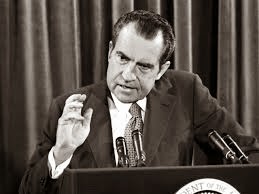 |
| President Richard Nixon: "I am not a crook" |
The French have this wonderful saying: "Plus ça change, plus c'est la même chose" which in essence in any language indicates a certain
disillusionment or resignation regarding whatever is being talked about.
For example: a company might make all kinds of policy changes, but the
personnel issues are unaffected.
Or a couple go to marriage counseling, but continue fighting about everything.
A new sheriff comes to town, but there is no noticeable impact on crime. New people, new promises, but the same old problems - plus ça change....
Or a couple go to marriage counseling, but continue fighting about everything.
A new sheriff comes to town, but there is no noticeable impact on crime. New people, new promises, but the same old problems - plus ça change....
 |
| Governor Chris Christie:" I did not know" |
Last week Thursday, Christie said, "I am outraged and deeply saddened to learn that not only was I misled by a member of my staff, but this completely inappropriate and unsanctioned conduct was made without my knowledge."
This
Wednesday morning, news outlets around the USA released emails that
strongly implied that in September a top aide to New Jersey Republican
Gov. Chris Christie planned a dangerous traffic jam near the George Washington Bridge to punish the Democratic mayor of Fort Lee. After over seven hours of silence, Christie—a possible presidential candidate in 2016—released a statement denying
he had knowledge of the aide's actions. Up until then, Christie and his
aides made numerous statements claiming his office had no involvement
in the scandal.
For some reason it brought back memories of Watergate and President Nixon's press conferences and statements at that time .
Some forty one years ago on November
17, 1973, Richard Nixon declared: "I am not a crook", as the President
at the time of the Wagtergate scandal vigorously
defended his record during the case and said he had never
profited from his public service.
"I have earned every cent. And in
all of my years of public life I have never obstructed justice," Mr.
Nixon said. "People have got to know whether or not their President is a
crook. Well, I'm not a crook. I've earned everything I've got."
In an hour-long televised question-and-answer session with 400 Associated Press managing editors, Mr. Nixon was tense and sometimes misspoke. But he maintained his innocence in the Watergate case and promised to supply more details on his personal finances and more evidence from tapes and presidential documents.
Yesterday January 9, New Jersey Gov. Chris Christie did a full blast, full house, two hour Press conference, responding to the George Washington Bridge traffic jam that had exploded on Wednesday and appeared to have imperiled his presidential aspirations.
He announced that he was firing the staffer responsible and that he would cut ties with one of his top political aides, and would be investigating what other abuses might be left uncovered. He then took round after round of questions in which he fulfilled most of the compulsory mea culpa requirements .
Governor Christie apologized, took responsibility, called himself “embarrassed and humiliated,”and even used an old Truman quote that "the buck stops here" in addition to expressing regret, denouncing the affair several times as "callous" and "stupid", and announced that he was going to be visiting the injured parties.
Somewhere it became more clear what the French mean by "Plus ça change, plus c'est la même chose ".
 EU-Digest
EU-Digest



